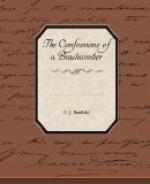“That one all right to-morrow,” was the reply to an inquiry.
But at five o’clock Tom visited his hut, and hurried back for medicine. “Little Jinny” was very bad. We went down with remedies that seemed fit from his diagnosis of the case and description of the symptoms, and there lay “Little Jinny,” obviously dying. She had never complained nor whimpered when Tom’s heavy hand had corrected her, though the dried trickle of blood had been seen on her forehead, and now that she lay a-dying, with her figure strangely swollen, she moaned only when Torn, with his heavy hand, sought to squeeze out the dead man, “all the same like debil-debil,” who was, according to him, the cause of the trouble.
But it was all too implacable and crafty a “debil-debil” for Tom to cast out. We did our best with brandy and steaming flannels; but it was all so useless, for none understood the sickness, or how to prescribe a remedy that might be effective. Our helplessness was grievous. We could only repeat the sips of brandy and water, and endeavour to warm the chilly little body with steamy flannels.
All did something. Even Nelly, the second best wife, who had had to play a very subordinate part in the camp, and whom “Little Jinny” had slapped and had abused with all the volubility of spite and temper, crouched beside her dying rival, chafing her cold hands and warming her cheeks.
And here was the most touching incident of the pathetic scene. We had brandy and blankets and flannels wherewith to endeavour to afford relief. Poor Nelly had nothing. Her poverty was grim, but she had some resource. She had no means of alleviating the suffering save those which spendthrift Nature provided—the smooth oily leaf of the “Raroo.” She used these aromatic leaves, all that she had, with no little art and tenderness. Warming them over the fire until the oil exuded, she would apply them to the hairy jowl of the girl, and anon to her furry forehead and cheeks.
While there is life there is hope is evidently Nelly’s creed, and so she crunched and warmed the pungently odorous leaves, and rubbed the hands that had often smitten her in anger. Poor Nelly sighed piteously as she continued her work, while Tom massaged the body of the girl, hoping to expel the “debil-debil!” His theory was, and is, that some man whom “Little Jinny” had known down about Hinchinbrook had died, and his “debil-debil all the same like dead man,” had “sat down” in “Little Jinny’s bingey,”—hence her distended condition.
His efforts to cast out this personal “debil” were futile, and as the poor creature lapsed into unconsciousness he would blow gusty breaths upon her big black eyes. It was his method of revivification. In my ignorance I knew none more to the purpose. But it was all in vain. The great eyes of this specimen of uncivilised humanity clouded over, and then brightened. She moaned in response to Tom’s well-intended but too forcible massaging. Nelly applied without ceasing the one means of relief that she possessed, the heated “Raroo” leaf, to cheek and forehead, while we exhausted our woefully meagre stock of knowledge in endeavouring to ease the last moments of the dying.




